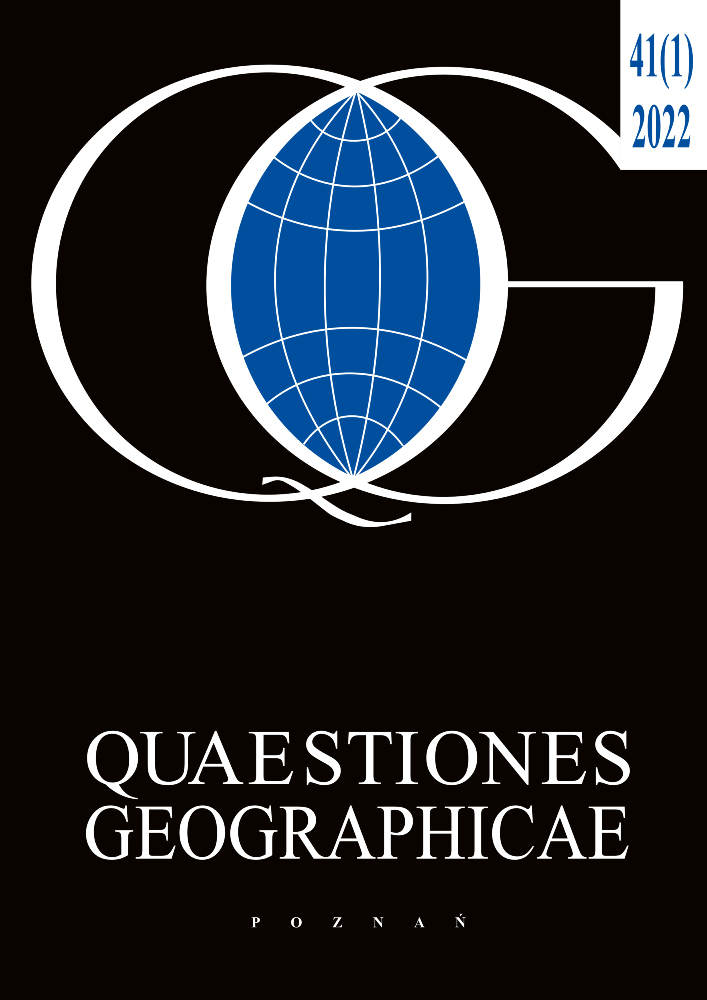Abstract
Developments in big data technology, wireless networks, Geographic information system (GIS) technology, and internet growth has increased the volume of data at an exponential rate. Internet users are generating data with every single click. Geospatial metadata is widely used for urban planning, map making, spatial data analysis, and so on. Scientific databases use metadata for computations and query processing. Cleaning of data is required for improving the quality of geospatial metadata for scientific computations and spatial data analysis. In this paper, we have designed a data cleaning tool named as GeoWebCln to remove useless data from geospatial metadata in a user-friendly environment using the Python console of QGIS Software.
References
Atluri V., Chun S.A., 2004. An authorization model for geospatial data. IEEE Transactions on Dependable and Secure Computing 1(4): 238-254. DOI: https://www.doi.org/10.1109/TDSC.2004.32.
Azri S., Ujang U., Rahman A.A., Anton F., Mioc D., 2014. Spatial access method for urban geospatial database management: An efficient approach of 3D vector data clustering technique. Ninth International Conference on Digital Information Management (ICDIM 2014). IEEE Conference Publications: 92-97. DOI: https://www.doi.org/10.1109/ICDIM.2014.6991400.
Bielecka E., Burek E., 2019. Spatial data quality and uncertainty publication patterns and trends by bibliometric analysis. Open Geosciences 11(1): 219-235. DOI: https://www.doi.org/10.1515/geo-2019-0018.
Boella G., Calafiore A., Grassi E., Rapp A., Sanasi L., Schifanella C., 2019. FirstLife: Combining social networking and VGI to create an urban coordination and collaboration platform. IEEE Access 7: 63230-63246. DOI: https://www.doi.org/10.1109/ACCESS.2019.2916578.
Deshmukh R.R., Wangikar V., 2011. Data cleaning: Current approaches and issues. IEEE International Conference on Knowledge Engineering: 61-66.
Eldrandaly K.A., Abdel-Basset M., Shawky L.A., 2019. Internet of spatial things: A new reference model with insight analysis. IEEE Access 7: 19653-19669. DOI: https://www.doi.org/10.1109/ACCESS.2019.2897012.
Gaikwad D.B., Wanjari Y.W., Kale K.V., 2014. Disaster management by integration of web services with geospatial data mining. Annual IEEE India Conference (INDICON): 1-6. DOI: https://www.doi.org/10.1109/INDICON.2014.7030685.
Jakobsson A., 2002. Data quality and quality management – Examples of quality evaluation procedures and quality management in European National Mapping Agencies. Spatial Data Quality. Taylor & Francis, London: 216-229.
Keim D.A., 2002. Information visualization and visual data mining. IEEE Transactions on Visualization and Computer Graphics 8(1): 1-8. DOI: https://www.doi.org/10.1109/2945.981847.
Koshley D.K., Halder R., 2015. Data cleaning: An abstraction-based approach. International Conference on Advances in Computing, Communications and Informatics (ICACCI). Kochi: 713-719. DOI: https://www.doi.org/10.1109/ICACCI.2015.7275695.
Kumar V., Khosla C., 2018. Data cleaning – A thorough analysis and survey on unstructured data. 8th International Conference on Cloud Computin. Data Science & Engineering (Confluence). Noida: 305-309. DOI: https://www.doi.org/10.1109/CONFLUENCE.2018.8442950.
Li J., Chen N., 2014. Geospatial sensor web resource management system for Smart CITY: Design and implementation. 14th IEEE/ACM International Symposium on Cluster, Cloud and Grid Computing: 819-827. DOI: https://www.doi.org/10.1109/CCGrid.2014.70.
Lim S., 2010. Cleansing noisy city names in spatial data mining. International Conference on Information Science and Applications: 1-8. DOI: https://www.doi.org/10.1109/ICISA.2010.5480390.
Parmar V., Sheoran S., 2021. Context-based spatial metadata cleaning using QGIS. Vidyabharati International Interdisciplinary Research Journal 12(1): 55-62.
Ridzuan F., Zainon W.M., 2019. A review on data cleansing methods for big data. Procedia Computer Science 161: 731- 738. DOI: https://www.doi.org/10.1016/j.procs.2019.11.177.
Sheoran S.K., Parmar V., 2020. Identification of alternative landfill site using QGIS in a densely populated metropolitan area. Quaestiones Geographicae 39(3): 47-56. DOI: https://www.doi.org/10.2478/quageo-2020-0022.
Thiyagalingam J., Getov V., 2006. A metadata extracting tool for software components in grid applications. IEEE John Vincent Atanasoff International Symposium on Modern Computing (JVA’06): 189-196. DOI: https://www.doi.org/10.1109/JVA.2006.3.
Yoshizumi A., Coffer M.M., Collins E.L., Gaines M.D., Gao X., Jones K., McGregor I.R., McQuillan K.A., Perin V., Tomkins L.M., Worm T., Tateosian L., 2020. A review of geospatial content in IEEE visualization publications. IEEE Visualization Conference (VIS): 51-55. DOI: https://www.doi.org/10.1109/VIS47514.2020.00017.
Zhao P., Zhao Q., Zhang C., Su G., Zhang Q., Rao W., 2019. CLEAN: Frequent pattern-based trajectory spatial-temporal compression on road networks. IEEE International Conference on Mobile Data Management: 605-610. DOI: https://www.doi.org/10.1109/MDM.2019.00127.
Zhao X., Huang Z., 2010. A quality evaluation approach for OLAP metadata of multidimensional OLAP data. IEEE International Conference on Information Management and Engineering: 357-361. DOI: https://www.doi.org/10.1109/ICIME.2010.5477583.
Zou T., Li W., Liu P., Su X., Huang H., Han Y., Guo X., 2018. An overview of geospatial information visualization. IEEE International Conference on Progress in Informatics and Computing (PIC). Suzhou. China: 250-254. DOI: https://www.doi.org/10.1109/PIC.2018.8706332.
Zylshal Z., 2020. Topographic correction of LAPAN-A3/LAPAN-IPB multispectral image: A comparison of five different algorithms. Quaestiones Geographicae 39(3): 33-45. DOI: https://www.doi.org/10.2478/quageo-2020-0021.

